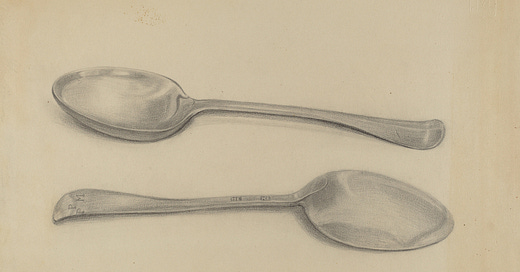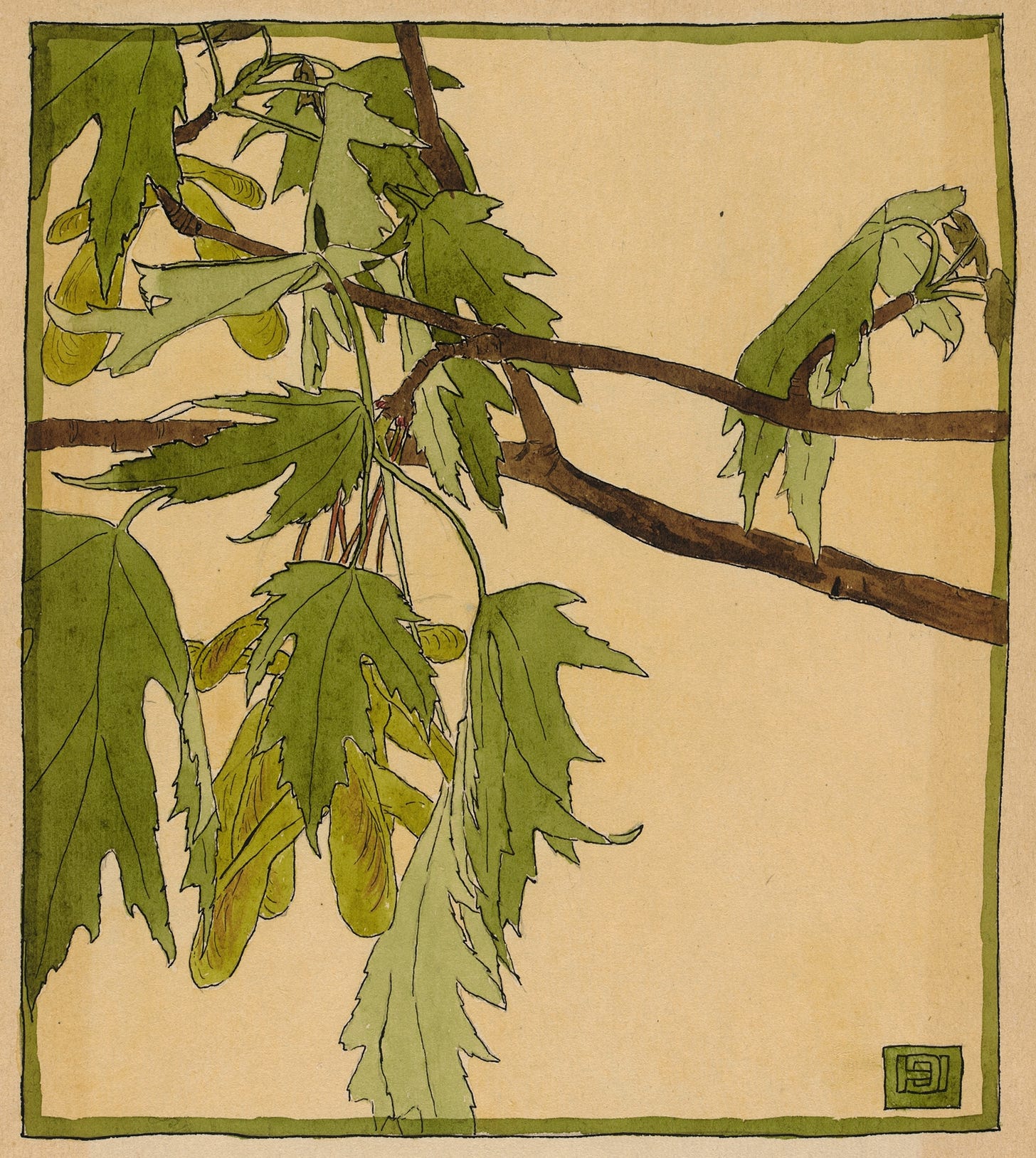📿 From The Bottom of The Laundry Basket
Illness! Travel! Expectations! Revisiting a piece of last year's Laundry
Hello you, Adreanna here with this week’s dispatch of The Laundry —
The final week of our month in Edinburgh was undercut by a combo of flu and cold that ravaged our little family - and our big ambitious plans to revisit all of our favorite spots one last time before leaving. I felt just well enough to order one last bowl of my favorite bouillabaisse, but wasn’t able to taste it. A bummer, but not a tragedy. Also from a Buddhist lens : this is samsara.
Being sick with a small, sick kiddo is one of the most humbling experiences I’ve had to date. Caretakers of all ilk: I tip my hat to you. Setting aside the biological imperative to rest when sick in order to tend to the needs of someone more vulnerable might be a path to enlightenment. I’m not kidding! And I’m not just saying this because it’s my current situation. It’s something many of us do for the beings that we love every single day. And also: It requires a little ego death to set oneself off to the side in favor of caring for someone else - especially when that care is gross or difficult or physically challenging.
Cleaning up macaroni puke can be an act of intimacy. It challenges our deep attachment to only having pleasant experiences or having things go our way. Changing a rancid litter box and sifting through dog poop for foreign objects also falls into this camp. What “I want” is not the central consideration when it comes to hands on, intimate care. It’s a little ego death and taste of non-attachment to be inconvenienced or grossed out or straight up sick while caring for someone beyond ourselves. Who needs the esoteric teachings! Just clean up vomit with an approach of love! It’s practice, y’all!
Isn’t that so much of what this practice of being a human is? Releasing attachment to expectation? Showing up fully to what life is serving? (Especially when it’s blegghh and you’re exhausted?) On that same note, the essay I had planned to write this week has been back burnered for the very same reason. Instead I’m writing you with a handful of disgusting descriptors of bodily fluids (sorry about that), AND a revisitation of a piece that I wrote here last year, below. It’s about gardening, in part. And neurosis. Which I can’t wait to get into once we’re settled back home and illness has passed us.
The gardening, not the neurosis. That will happen regardless of the season.
In practice ~ Adreanna
📿 Jiggle Them Out Of The Soil
When I’m lucky enough to go play in the dirt I find myself pulling maple shoots out by the dozens.
It’s become a daily practice of sorts, grabbing the base of their fledgling stems and jiggling them out by the root. We have maple saplings growing anywhere that they’re able to eke out an inch of soil. There are maples growing in our rosemary pots and in the corners of our gutters. Maples growing in the cracks of our stairs and between the wide planks of our deck.
I sometimes imagine what our house would look like if it were abandoned for twenty years. I envision maple trees growing up through our foundation, with branches breaking through windows. To love this house is to commit to culling the maples before they grow destructive.
To love this house is to commit to culling the maples before they grow destructive.
This is the thought that got me thinking about pulling these maple shoots as a metaphor. Because isn’t this the commitment that’s at the heart of caring for… anything, really? At the very least, it’s an important facet of care. I think of all the tiny resentments, judgements, and neurotic habits of mine that start off like tender maple shoots — inconsequential, really — that have the potential to grow destructive if they’re not kept in check.
There’s a phrase that I first heard from Lama Rod Owens that “if we don’t do our own work, we become work for other people.”
In Buddhism we might call this working with our neuroses, or our confusion, or the more middle of the road sounding “tendencies”. These often take shape for me as perfectionism, judgement, or dropping off the map in isolation when things get messy and difficult. It doesn’t take much for these habits to grow; just an inch of psychic soil, watered by some collaborating thoughts, and these tendrils quickly sprout leaves.
Like the maples I’ve found that the trick is to jiggle them out by their fledgling stems before their roots grow too deep. In practice this looks like catching the impulse to shit-talk before the criticism leaves my mouth. Or zooming outward to get a fuller perspective before I beat myself up with my own expectations.
There’s an easy parallel between gardening and meditation. Both are studies in biology; interested in observing the growth and behavior of living beings. Maybe this is why gardening metaphors are so abundant in Buddhism? We talk of planting seeds. Root causes. Watching our actions bear fruit. In Pali, the original language of the Buddha, “bhavana” is a word that’s frequently translated as “meditation”. It more specifically means “to cultivate, to develop, to call into existence, to grow”.
In both gardening and meditation there’s some sense of calling into existence a wisdom from the depths. We might call this primordial wisdom — or prajna — the knowing that comes before knowing. We might also call this Earth wisdom, which exists in every living being. In the same way that a seed, a nut, a bulb and a pit all contain the knowing of how to become, we all contain the knowing of how to develop into the fullest expression of self. Our job is just to create fertile conditions. To tend to our inner life like a garden. Which also means culling the maple shoots before they grow destructive.
The largest maple tree in our yard is (estimated) 40 feet tall and over 200 years old. Each fall it spins thousands of helicopter seeds down into the soil with the purpose of growing more maple shoots. This is a good reminder that the source of these maples is much older and bigger than I am. This brings me some humility, and awe at the scope of what I’m grappling with.
Sometimes I’ll find a maple in my (literal) garden that’s been there for generations. There are a few in my flower beds that have been clipped down to stumps, though their root systems remain entrenched. Who knows how deep they go; they likely sprawl under fences and rock boarders, possibly intertwined with other root systems of nearby plants. Every season they sprout fresh offshoots, looking to reestablish themselves and grow. I cut them back, and they grow again. I cut them back, and again they grow. It’s a game of continual maintenance — one that doesn’t have an end.
I’ve considered digging these maple stumps out once and for all, but it would also mean causing considerable damage. Each season I survey the flourishing plants that surround it, healthy and flowering, and decide that it’s not worth it. Maybe the healing is in the continual maintenance? Isn’t this what gardening tools are for? I imagine that some roots are worth digging into, no matter the upheaval they cause. Some, however just get quietly integrated and regularly pruned in the larger context of the beauty surrounding it.
(This is still a metaphor.)
When I first started meditating seriously, I had this assumption that it would eventually “fix” me. I imagined it would make my mind a place that was no longer hospitable to “maples”, or neurosis, or unhelpful habits that left an icky residue. I didn’t consider that the pruning was the practice; that the awareness that arises on the meditation cushion just gives us insight into how and where and what to pull.
I think of a passage by Pema Chodron, who writes:
“Our wisdom is all mixed up with what we call our neurosis. Our brilliance, our juiciness, our spiciness, is all mixed up with our craziness and our confusion, and therefore it doesn’t do any good to try to get rid of our so-called negative aspects, because in the process we also get rid of our basic wonderfulness. We can lead life so as to become more more awake to who we are and what we’re doing rather than trying to improve or change or get rid of who we are… The key is to wake up, to become more alert, more inquisitive and curious about ourselves.”
And so, when I’m lucky enough to go play in the dirt, I find myself pulling maple shoots out by the dozens. Which isn’t a problem, really. It’s an act of care, of maintenance, and sometimes — of integration. At the very least it gives me a chewy metaphor for working with my neurosis. At the end of the day, all of this is practice. Which sometimes involves literal dirt.
Thank you for reading along with us! If you’d like to support our work here at The Laundry, restacking this post, sharing it, or giving it a “heart” goes a long way. And as always, I love to hear your thoughts, reflections and questions in the comments. I wrote a few thoughts down, but your presence gives it life. 🌺













Adreanna, what a beautiful posting full of insight, love and tenderness. It took me back to my days helping to care for my baby sister and never really thinking twice about the stinky nappies, returned oatmeal on my neck and shoulder and warm drool on my chest. Trying to push my desire away to be out with friends, that big goofy smile and giggle sealed the deal.
Thanks for sharing. Neil.
Adreanna, you are simply the best....so human....so humbling...so easy to relate to if one has been a mother and been unwell along with her little one (s). Without getting graphic I can only say been there as have so many of us. In gratitude. Thank you.